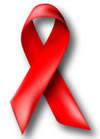
|
HIV-infected adults diagnosed with age-related diseases at similar ages as uninfected
Successful treatments are helping HIV-infected persons achieve similar longevity as those without HIV
11-Nov-2014 - New research from the Johns Hopkins Bloomberg School of Public Health suggests that HIV-infected adults are
at a higher risk for developing heart attacks, kidney failure and cancer. But, contrary to what many had believed, the researchers say
these illnesses are occurring at similar ages as adults who are not infected with HIV.
The findings appeared online last month in the journal Clinical Infectious Diseases .
Researchers say these findings can help reassure HIV-infected patients and their health care providers.
"We did not find conclusive evidence to suggest that screening for these diseases should occur at younger ages in HIV-infected compared
with uninfected adults," says Keri N. Althoff, PhD, MPH, an assistant professor in the Department of Epidemiology at the Bloomberg School
and lead author of the study.
Using data from 98,687 HIV-infected and uninfected adults in the Veterans Aging Cohort Study from April 1, 2003, to Dec. 31, 2010, the
researchers were able to compare the ages at which each group was diagnosed with heart attacks, kidney failure and cancers unrelated to
AIDS. Althoff and her colleagues found that HIV-infected adults were diagnosed with kidney failure, on average, when they were six
months younger than the group without HIV. There were no statistically significant age differences at diagnosis between infected
and uninfected adults for heart attacks or cancers unrelated to AIDS.
The study also compared the risk of these age-related diseases in HIV-infected and uninfected adults. Similar to previous studies,
HIV-infected adults appear to be at an increased risk of these diseases, but the magnitude of the increase in risk was smaller
than has been reported in many of the previous studies, likely due to this study's ability to adjust for factors such as
race, gender, obesity, smoking, diabetes, and depression, among others, influencing the risk in both HIV-infected and uninfected adults.
In the early years of the AIDS epidemic, HIV was a death sentence. But in recent years antiretroviral therapy (ART) has been proven highly
effective at suppressing HIV viral replication and increasing longevity for people with HIV. A study published in December 2013 in the
North American AIDS Cohort Collaboration on Research and Design (NA-ACCORD) shows that the life expectancy among HIV-infected adults
is only a few years shy of the U.S. general population.
While HIV-infected people are living longer, there has been a contentious debate in medical circles about whether they are undergoing an
accelerated aging process. People living with HIV have demanded a more rigorous study of whether and why this may be happening.
Just because the data show that the onset of these three diseases is similar between those with and without HIV doesn't mean those with
HIV are just as healthy, Althoff cautions.
"Many HIV-infected adults feel older than their age," she says. "Our study looks at three important age-related diseases and we find no
meaningful difference in age at diagnosis. But this isn't the whole story. We need more research to figure out what is going on."
###
"Comparison of risk and age at diagnosis of myocardial infarction, end-stage renal disease, and non-AIDS-defining cancer in HIV-infected
vs. uninfected adults" was written by Keri N. Althoff, PhD, MPH; Kathleen A. McGinnis, DrPH, MS; Christina M. Wyatt, MD, MS;
Matthew S. Freiberg, MD, MSc; Cynthia Gilbert, MA; Krisann K. Oursler, MD, MS; David Rimland, MD; Maria C.
Rodriguez-Barradas, MD; Robert Dubrow, MD, PhD; Lesley S. Park MPH, MPhil; Melissa Skanderson,
MSW; Meredith S. Shiels, PhD; Stephen J. Gange, PhD; Kelly A. Gebo, MD, MPH; and
Amy C. Justice, MD, PhD for the Veterans Aging Cohort Study.
The Veterans Aging Cohort Study is supported by National Institutes of Health's National Institute on Alcohol Abuse and Alcoholism
(U24-AA020794, U01-AA020790, U01-AA020795, U01-AA020799, U24-AA022001, U24 AA022007 and U10 AA013566-completed); National Heart,
Lung, and Blood Institute (R01-HL095136 and R01-HL090342); National Institute of Allergy and Infectious Diseases
(U01-A1069918); National Institute of Mental Health (P30-MH062294); National Institute on Drug Abuse
(R01DA035616); the National Cancer Institute (R01 CA173754); the Agency for Healthcare Research
& Quality (R01-HS018372); and the Veterans Health Administration Office of Research and
Development. The researchers were supported by the National Institute of Allergy and
Infectious Diseases (K01-AI093197); the National Cancer Institute (F31-CA180775);
the National Institute of Diabetes and Digestive and Kidney Diseases
(P01-DK056492); and the Intramural Research Program of the National Cancer Institute (MSS).
Contact:
Stephanie Desmon
sdesmon1@jhu.edu
410-955-7619
Johns Hopkins University Bloomberg School of Public Health
@JohnsHopkinsSPH
Source: http://www.eurekalert.org/pub_releases/2014-11/jhub-had111114.php
For more HIV and AIDS News visit...
Positively Positive - Living with HIV/AIDS:
HIV/AIDS News
|